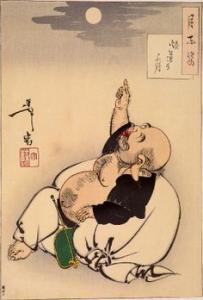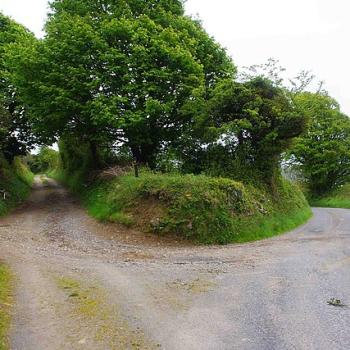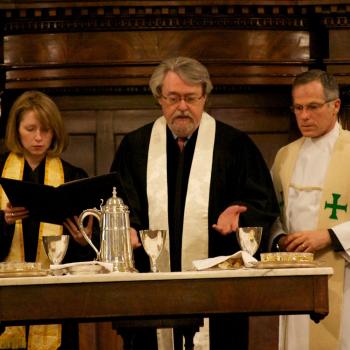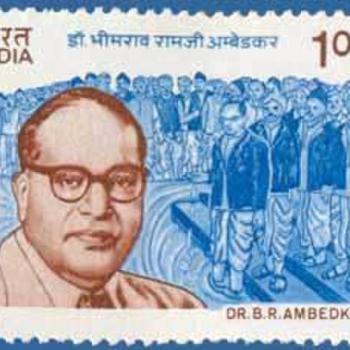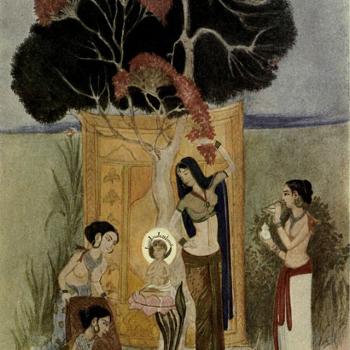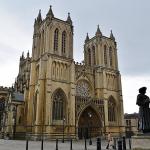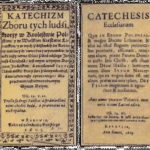Zen, the Tangle of Language, and the Heart of Our Liberation
James Myoun Ford
The Case
The priest Ruiyan called out to himself every day, “Master!” And, then responded, “Yes!” Then he would say, “Be aware!” And again, he would respond, “Yes, yes!” He would then say, “Don’t be deceived by others!” And he would respond, “No, no!”
Gateless Gate, Case twelve, my paraphrase
We don’t know a great deal about Ruiyan Shiyan, not even the precise dates of his life, beyond living between the ninth and the earlier part of the tenth centuries. We do know he studied with Jiashan Shanhui and later with the great Yantou Quanhuo from whom he would receive the dharma seal.
I am enchanted with the story of his first encounter with Yantou. Ruiyan asked, “What is the eternal truth?” Yantou met him with the response “you missed it.” The conversation continues with Ruiyan, and I can picture, his sincerity, asking, “What did I miss?” To which Yantou replied, “It is no longer the eternal truth.”
This reminds me of my own original question, which I formulated as “Is there a God?” And, then, over a couple of years, realized it had mutated and maybe more accurately representing my heart, “what is God?” I don’t know if I could have heard it at that time, but this conversation between Yantou and Ruiyan is exactly to the point. Master. Eternal truth. Is there a God. What is God. The word said, the point lost.
Words are so complicated, so messy.
I just received a note from someone who addressed it to “James (if I may).” I thought that was sweet. There was something about that parenthesis. Politeness has become a bit rare in our times. More importantly, the question and what to name me, raised some thoughts for me about names, and things, and you know, Zen. That line really does open the door to the messy, to the complicated. And, with a little luck to the mystery that is both beyond words, and, totally, completely found in a word.
With that small aside, back to the case. I particularly delight in the small point that while the versions of this story that I worked with investigating the matter of koans, concludes with Ruiyan responding to that admonishment he gives himself to not be deceived by others, has him say “no, no!” in at least one other translation the response is “yes, yes!”
Names. Words. Master. Eternal truth. God. Missing. No, no. yes, yes.
Of course, in part the invitation is not to be tangled in words. Yes and no are both powerful things, and each melts into the other, and neither can be held too tightly.
In his commentary on this case, my grand teacher Robert Aitken Roshi cites that famous line from the Soto master Eihei Dogen:
“To study the Buddha Way is to study the self. To study the self is to forget the self. To forget the self is to be confirmed by the myriad things. To be confirmed by the myriad things is to cast off body and mind as well as those of others. No trace of realization remains and this no-trace is continued endlessly.”
So, another question. Two, actually. What is this forgetting? And, with that, what is this finding?
Master. Eternal truth. God. Missing. No, no. Yes, yes. And, just to throw some pebbles into the machine, our longing hearts pulling us into the questions.
In his commentary on this case the Rinzai master Zenkei Shibayama tells us a number of things:
“Commonly speaking, (Master) would be a name given to a subject standing over against an object: a master is a master of something. Here, however, the Master does not refer to the subjectivity that stands over against objectivity. It is ‘Absolute Subjectivity,’ which transcends both subjectivity and objectivity and freely creates and uses them.” A bit further on he continues, “Master (Ruiyan) gave the name ‘Master’ to this ever unnamable Reality; Master (Juzhi) stuck up one finger; Master (Huineng) called it ‘Original Face;’ Master (Linji) named it ‘This true Man of no title.’”
Finally, Shibayama Roshi adds in how we can find something resonant here with the Biblical line, “Before Abraham was I am…”
Pretty much everyone, at least, in my circles knows that famous poem, the first chapter in the Chinese Daoist classic the Dao de jing. In my paraphrase:
The Way that can be told is not the eternal Way.
The name that can be named is not the eternal name.
The nameless is the beginning of heaven and earth.
While the named is the mother of the ten thousand things.
Without clinging, one can find the mystery.
Grasping after that which passes, we see the manifestations.
Mystery and manifestation have different names, but both spring out of darkness.
Darkness within darkness.
The door to all mysteries.
It’s all here.
But, it’s also in this case. In his anthology Master Wumen appends an appreciatory verse to this case.
Followers of the Way do not know this truth;
They only know their own consciousness up to this moment;
This is the source of endless birth and death;
The fool calls it our original self.
While Master Shibayama’s analysis is a bit abstract it is also a direct pointing. It can work that way. The words themselves may not be the thing in itself, in fact, within the moment, stripped away of all eternals, it is in fact the thing in itself.
We are invited into a moment of pure presentation. Here, the word and the thing the word points to both fall away. It is the source of all our ideas, including of birth and of death. And, yes, yes, it is the foolish truth we also call Master, we call one finger, we call the thing in itself, what we call our original self.
Master. Eternal truth. God. Missing. Yes, yes. No, no. Don’t tangle. Words. Mystery. Don’t miss the presentation.
It’s all here.


